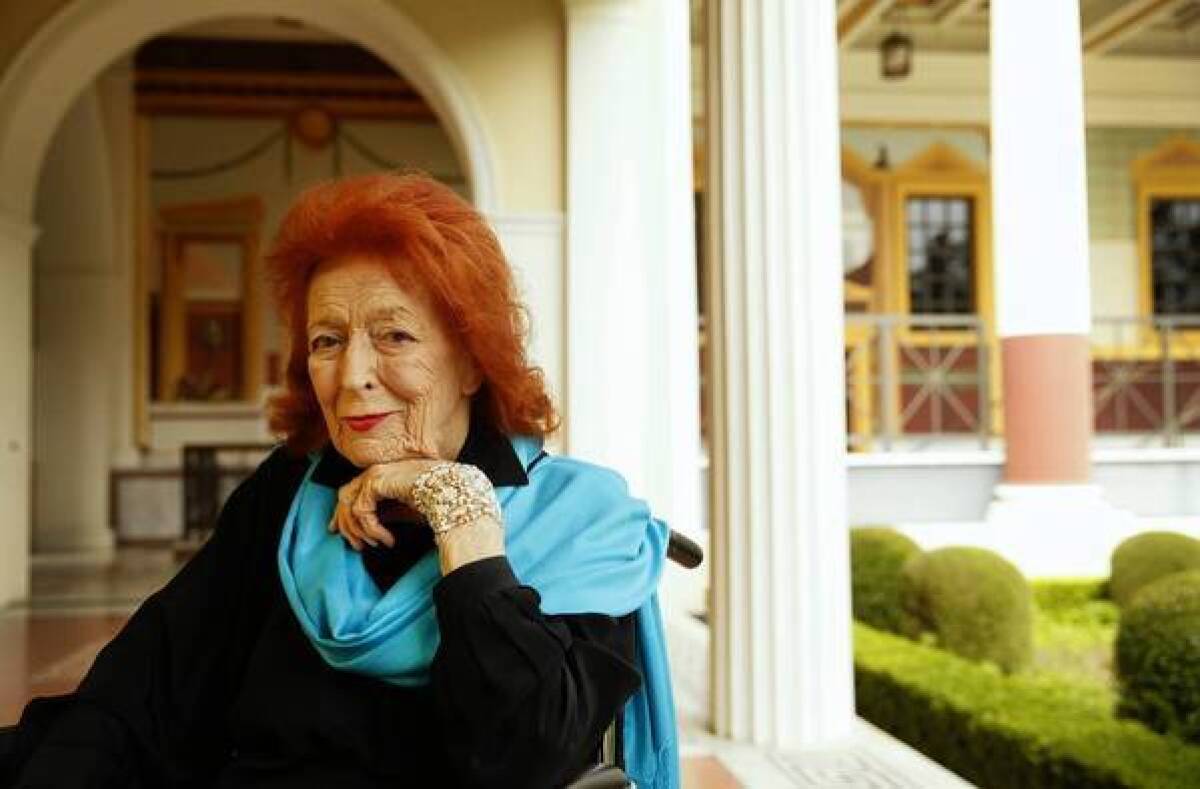Theodora Getty Gaston recalls life with J. Paul Getty in ‘Alone Together’

The crimson-haired woman makes sure to offer snacks to each person entering the room. She’s seated at the end, next to a carved marble fireplace that doesn’t entirely match the rest of the neutral corporate décor.
It used to be different here. “It was a very beautiful living room, with beautiful chairs and lovely couches,” she says. That’s when this place was hers and J. Paul Getty’s. They called it their ranch; we call it the Getty Villa.
Theodora Getty Gaston — Teddy — will turn 100 this month, just in time for the publication of her new memoir, “Alone Together: My Life With J. Paul Getty” (Ecco: 416 pp., $26.99). In person, Gaston is sweet and sharp. Recounting the incredible stories of her life, she is alternately lighthearted and serious, demure then sassy.
She recalls a museum tour guide saying that she and J. Paul Getty never slept at the Villa-slash-ranch. “If we didn’t sleep here, who the hell was I sleeping with?” Gaston asks wryly. “We didn’t tell everybody in the United States, hey, we two are going up to sleep at the ranch. We didn’t announce it. We just came here, went to bed, got up in the morning and had breakfast and left.”
She’s using “sleeping” euphemistically, and there’s a surprising sexual frankness in the book, particularly for a centenarian society girl raised in Greenwich, Conn. She vividly describes her own love affairs, and in the first pages, she describes being sexually assaulted by her stepfather.
Striving for independence after college, Teddy Lynch launched a singing career. This was 1932: In a successful Depression-era gambit to bring the still wealthy in the door, the Waldorf Astoria booked debutantes to sing, giving them dinner and $25 a week.
“Although no one knew it, I was the only girl living on that $25 a week. The others still lived with their families on Park Avenue or in River House,” she writes. She shared a dingy apartment with two other girls, “and slept in a single bed right under a huge window overlooking the back alley filled with trash. It was summer, and we had to leave the window open to catch whatever breeze might come our way, no matter how bad it smelled.”
That recall makes the book so engaging. “Her voice was so attractive,” says co-writer Digby Diehl, co-author of bestselling memoirs from Dan Rather and Esther Williams and a former Times editor. “She would weave this extraordinary time of dinner dances and the Hamptons — a time she recollects very clearly.”
Her singing brought her and Getty together. She describes their meeting with crystal clarity. She was singing at a chic club; he was struck by the quality of her voice and asked her to dance. “Usually they say, ‘Well, you’re a pretty sexy dancer, I want to [pause], let’s go home,’” she says, waving a hand. “And this man is talking about the quality of my voice.”
He fell for her as a torch singer but believed she could sing opera. When their love affair began, he paid for her to take lessons from magnificent teachers — something she writes that she accepted only after insisting on paying him 10% of her future singing earnings.
“I have the canceled checks, and he signed them!” she says. This might be unusual behavior for a billionaire, but Getty was notoriously tightfisted. Before their 1939 marriage, he had her sign a prenuptial agreement and, in later years, he became increasingly ungenerous with her. But first he swept her off her feet.
The billionaire, the beautiful young singer he grooms — there are echoes here of “Citizen Kane,” and it’s perhaps no coincidence that Gaston did know William Randolph Hearst, upon whom the film was based. For many years, Gaston lived in Santa Monica right next door to Marion Davies and her legendary beach house. The key difference between Gaston and the film character: Gaston was a genuine talent — she sings opera in the Oscar-winning “The Lost Weekend”.
“Alone Together” is a whirlwind tour through the storied places and people of the early 20th century: the Stork Club and the Russian Tea Room, appearances by Bette Davis, Henry Fonda, Jesse Lasky. Hollywood never became the center of her world, though. Gaston studied opera in England and Italy and was so determined to work until she could perform opera on stage that when Getty returned to America, she stayed behind in Rome.
It was far too close to the onset of World War II. “I remember coming out of the American Embassy, and a man was going by saying, ‘Avanti avanti, Il Duce.’ I thought, ‘Well, I’m going to hear him now. Personally.’ So I followed him to the area where Mussolini was speaking,” she says.
“I was in the palazzo — the piazza, you call it — right beneath where he lived, and he came out there strutting like a little [here, she pauses] poo poo.” In her seat, more than a half-century later, Gaston mimes Mussolini’s strut.
It’s hard to fathom Getty not trying harder to bring her home, but Gaston says she was insistent. Tensions escalated into war, and things became increasingly harrowing; she couldn’t get an exit visa. She served a stint as a journalist, then was thrown into Italian prison.
When Gaston made it back to the U.S. in 1942, she was surprised to find that Getty expected her to become a homemaker in suburban Oklahoma, where he was contributing to the war effort by running Spartan Aircraft. She soon moved to a beach house in Santa Monica, while her husband split his time between Oklahoma and California.
According to the book, Getty kept his business dealings — some of which have been criticized by historians — at arm’s length. The marriage had its share of good times, which Gaston is able to recall with a clear-eyed fondness, and bad, which included a number of affairs.
“He was sort of stupid. Like all men are,” she says, more amused than angry. “Stupid doing those silly little things.”
At least she had a career of her own again — for a while, she had a radio show — and she and Getty had a son, Timmy. Born in 1946, Timmy saw little of his father, who in 1951 decamped for Europe where he was negotiating deals with oil brokers of the Middle East.
Their son Timmy was diagnosed with a brain tumor, undergoing a series of operations from the time he was 7. Getty refused to return to the U.S. while lambasting Gaston over the costs of Timmy’s care. From the Ritz Hotel in Paris, Getty wrote that doctors “grossly overcharged you,” adding, “Frankly I never liked the Cedars of Lebanon hospital. It may be a movie type joint. I will investigate these charges and get the reasonable portion of them paid. I hope Timmy can keep away from doctors, except for a $10 visit.” Timmy went for a two-year stretch without seeing Getty at all.
At age 12, Timmy died. Gaston was with him at a New York hospital; Getty was in Europe.
“Oh, my God, he was so far away,” she says now. “It was horrible to go through it alone.” The memoir ends with Timmy’s death, which came two years after Gaston and Getty had divorced.
The life she has lived since then — marrying longtime family friend William Gaston, having her daughter Gigi (now a filmmaker) in her late 40s, and breaking her neck at age 92 when an SUV ran a red light and smashed into her car — will have to come in another book. Which 100-year-old Teddy Gaston just might have in her.
Theodora Getty Gaston will be signing “Alone Together” at the Barnes & Noble at the Third Street Promenade, Santa Monica, on Sunday, Sept. 15, at 2 p.m.
[For the record, 9:15 a.m. PDT Sept. 6: An earlier version of this post said Gaston’s signing would be on Saturday. It will be on Sunday, Sept. 15.]
More to Read
Sign up for our Book Club newsletter
Get the latest news, events and more from the Los Angeles Times Book Club, and help us get L.A. reading and talking.
You may occasionally receive promotional content from the Los Angeles Times.







